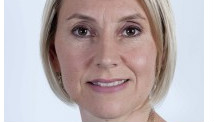NEW YORK (Reuters) - Stocks ended flat on Thursday, giving up modest gains late in the session, denying the Dow a chance to inch closer to all-time highs.
The S&P 500 still managed to close out February with a fourth straight month of gains. JC Penney Co Inc
The U.S. economy grew slightly in the fourth quarter, a turnaround from an earlier estimate showing contraction, and a drop in new claims for unemployment benefits last week added to a batch of data suggesting the economy continues its sluggish improvement.
The Dow was within striking distance of its record high after a year-to-date advance of more than 7 percent. The Dow's record closing high, set on October 9, 2007, stands at 14,164.53, while the Dow's intraday record high, set on October 11, 2007, stands at 14,198.10.
The Dow Jones Transportation Average <.djt>, seen as a bet on future growth, is up 12.9 percent this year, and the 20-stock index hit a record intraday high earlier on Thursday.
"To push through to new highs, you would have to see consistent positive economic data in the U.S. and have Europe stabilize - those are two pretty big requirements," said Jeff Morris, head of U.S. equities at Standard Life Investments in Boston.
"It wouldn't surprise me to see us bounce around as we have the past couple of weeks," Morris added.
Volume was low for most of the session until quarterly index-rebalancing activity hit the tape at the very close of trading.
After a strong January with gains of more than 5 percent, both the Dow and the S&P 500 found gains tougher to come by in February. Minutes from the Federal Reserve's January meeting sparked concerns that the central bank may pull back on its stimulus measures sooner than expected, while looming U.S. budget cuts and turbulent Italian elections tempered investors' aggressiveness.
But concerns about Fed policy were eased by testimony from Fed Chairman Ben Bernanke before a congressional committee earlier this week, as he defended the policy of buying bonds to keep interest rates low to boost growth, despite worries some have about possible inflation.
The Dow Jones industrial average <.dji> shed 20.88 points, or 0.15 percent, to 14,054.49 at the close. The Standard & Poor's 500 Index <.spx> lost 1.31 points, or 0.09 percent, to 1,514.68. The Nasdaq Composite Index <.ixic> fell 2.07 points, or 0.07 percent, to end at 3,160.19.
For the month, the Dow rose 1.4 percent, the S&P 500 gained 1.1 percent and the Nasdaq advanced 0.6 percent.
Limited Brands
In contrast, shares of Groupon Inc
Cablevision
On a positive note, Mylan Inc
Investors were keeping an eye on the debate in Washington over U.S. government budget cuts that will take effect starting Friday if lawmakers fail to reach agreement on spending and taxes. President Barack Obama and Republican congressional leaders arranged last-ditch talks to prevent the cuts, but expectations were low that any deal would emerge.
Volume was modest with about 6.81 billion shares traded on the New York Stock Exchange, NYSE MKT and Nasdaq, slightly above the daily average of 6.46 billion.
Advancing stocks slightly outnumbered declining ones on the NYSE by 1,518 to 1,446. On the Nasdaq, the decliners had a slight edge, with 1,247 shares falling and 1,201 stocks rising.
(Reporting by Chuck Mikolajczak; Editing by Jan Paschal)


